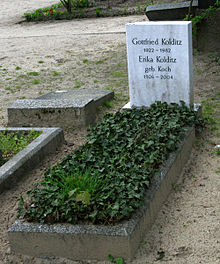Gottfried Kolditz
Gottfried Kolditz (* 14. December 1922 in Altenbach , Amtshauptmannschaft Grimma ; † 15. June 1982 in Dubrovnik , SR Croatia , Yugoslavia ) was a DEFA - feature film director and - screenwriter . With almost 20 films he was one of the most productive and continuously working DEFA directors of the 1960s and 1970s. Many of his films were great audiences in the GDR .
Life

Born as the son of a farm laborer in Altenbach, Kolditz studied German language and literature in Leipzig from 1945 to 1949, and from 1947 to 1949 acting and directing at the Leipzig Theater School. At the beginning of the 1950s, Kolditz did his doctorate in Leipzig under Theodor Frings . At the same time, he had already started working as an actor and director at various theaters - in Leipzig, Dresden , Rostock and Karl-Marx-Stadt , where he was most recently senior theater director .
In 1955 he went to DEFA as a musical advisor for the music films Zar and Zimmermann and Mazurka der Liebe .
In 1958 he shot his first feature film The Young Englishman based on Wilhelm Hauff with Jean Soubeyran for the film series Das Stacheltier , which was stylistically based on Expressionism . In the following two decades, Kolditz, who was considered to be keen to experiment, worked in a wide variety of genres: he made fairy tale films , comedies , musicals and science fiction films. With Signals - A Space Adventure , he tried to technically follow Stanley Kubrick's 2001: A Space Odyssey . The film received an award in Paris for its trick sequences. He also wrote several science fiction shorts that appeared in anthologies and in the series The New Adventure .
At the end of the 1960s, Kolditz had also started to write the scripts for his films. The idea for the Heinz Erhardt comedy Triplets on Board came from him under the pseudonym Lothar Koch .
Most enduringly, however, his name was associated with the DEFA Indian films , which were very popular in the GDR, with the Yugoslav actor Gojko Mitić in the lead role, of which he directed three. Originally conceived as an - also ideological - answer to the Karl May films , they developed into a genre of their own in the GDR. Kolditz died immediately before shooting a new Indian film while he was preparing a two-part pirate film as a German-German co-production.
Since the DEFA had a political educational mandate (to promote the right, i.e. socialist consciousness), the concentration on genre films (pejoratively dismissed as entertainment films) meant from the outset also the extensive ignorance by the criticism. As apolitical as the films appeared to be, they were at the same time a romantic protest against discipline and permanent fulfillment of duties in a film landscape that was ideologized right down to the aesthetic level, defending the existence of a liberating pleasure principle and thus the right of the individual to a life beyond the daily stresses and strains .
His son Stefan is a successful writer as well as a playwright and screenwriter.
Films (directing)
- 1957: Dance in the gallery
- 1958: The young Englishman
- 1959: Simplon tunnel
- 1959: white blood
- 1960: The beautiful Lurette
- 1961: The golden yurt
- 1961: Snow White
- 1962: Revue at midnight
- 1963: Mrs. Holle
- 1964: Beloved white mouse
- 1966: The valley of the seven moons
- 1967: Gisela May sings Brecht (TV show)
- 1968: Trail of the Falcon
- 1970: Signals - A space adventure
- 1973: Apaches (also screenplay)
- 1974: Ulzana (also screenplay)
- 1976: In the dust of the stars (also screenplay)
- 1979: Addio, piccola mia (actor)
- 1979: The thing in the castle (also screenplay)
- 1983: The Scout (screenplay)
Theater (direction)
- 1953: Vsevolod Wischnewski : Optimistic Tragedy - ( Städtische Theater Karl-Marx-Stadt )
- 1954: Friedrich Schiller : Cabal and Love - (Städtische Theater Karl-Marx-Stadt)
Web links
- Literature by and about Gottfried Kolditz in the catalog of the German National Library
- Gottfried Kolditz at filmportal.de
- Gottfried Kolditz in the Internet Movie Database (English)
- DEFA Film Library Catalog (English)
- http://www.epilog.de/person/K/Kof_Kol/Kolditz_Gottfried_1922.htm
Individual evidence
- ↑ Compare the information in the catalog of the German National Library
- ↑ Gottfried Kolditz in the Internet Speculative Fiction Database (English)
| personal data | |
|---|---|
| SURNAME | Kolditz, Gottfried |
| BRIEF DESCRIPTION | German DEFA feature film director |
| DATE OF BIRTH | December 14, 1922 |
| PLACE OF BIRTH | Altenbach , Saxony |
| DATE OF DEATH | June 15, 1982 |
| Place of death | Dubrovnik , Croatia |